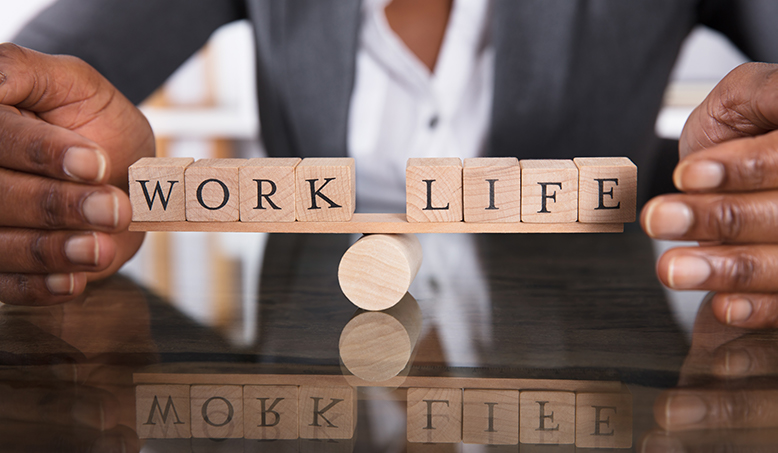With living costs spiralling out of control, those who can work more are choosing to. Research has found that 5.2 million workers have taken on an additional job to help pay for the increased cost of living and another 10 million plan to, in response to rising costs.
Ultimately, this is an understandable approach as it’s important to keep the lights on, the heating working and a roof over our heads. But while people in the UK are taking on more job responsibilities we must remember to keep a healthy balance between working and other aspects of our lives.
From spending time with our family to self-care, finding the balance to take time away from work is more essential than ever. Let’s look at some ways we can get the work-life balance mix right.
Assess your situation
First things first, it’s important to assess your current workload to take stock of how much you are doing. Working 9 to 5 is a good base to start with and about seven to eight hours per day is a good average.
If you find your schedule edging close to or running beyond 10 hours per day, five days a week, there is a high chance you will burn yourself out. Overworking can lead to greater levels of stress and anxiety while your sleep can be impacted which creates a never-ending cycle of tiredness.
We must rest to recover our bodies and minds from the rigours of working but that’s not all. Working all hours of the day can disrupt your eating habits, make you less likely to exercise due to a lack of energy and start to impact your relationships.
Taking proper breaks
Taking proper and regular breaks throughout your working day can keep your energy levels up while reducing mental fatigue. There comes a point of diminishing returns when working too much but if you are working from home the temptation can be to fight through, often working well into the night.
By re-energising, you will be more efficient and complete tasks with greater accuracy, helping you to finish your working day in good time and spend time doing the things you love. Taking a small regular break every hour helps you to process and retain information while boosting your creativity and helping you feel less overwhelmed.
Consider adopting the Pomodoro Technique, which is 25 minutes of focused work followed by a five-minute break. This can be repeated until lunchtime and then clocking off time to help you be more productive and procrastinate less.
Establish a work zone at home
One of the keys to enjoying a better work-life balance is to shut off from work completely once the day is over. But a problem that many people face in a culture of hybrid and remote working is being able to separate their living space from work.
People working from home are commonly sitting at their dining room table, a desk in a bedroom or even on the sofa. Remote working is a great enabler of a better work-life balance as you don’t need to commute but if not done right it can make little to no difference.
While most people don’t have enough rooms in their homes for a designated office or study, finding a way to separate home and work is essential. Whether that’s choosing to work in a cafe or shared space to create some distance or you make sure to unplug your work device at the end of the day and avoid it until the following morning.
Good financial habits for freelancers
Money is a stress that is at the very forefront of many people’s minds, whether you work full-time, part-time or run your own business. Some people have even found themselves choosing to take on some freelance work, either as their primary source of income or as something to supplement it.
But, while the money in your pocket is welcome, it’s important to be organised and efficient with your invoices. Consult with a financial expert for tax advice and help with tax planning, from what you can claim as expenses to loopholes that can save you money.
Regularly updating your financial records makes it a bite-size task rather than a huge mountain of work that you might stress about. You can be more free when you know exactly what is coming in and what’s going out. Given the fears of energy costs throughout the winter, knowing where you stand can help you budget to ensure your bills are covered.
Maintain an exercise routine
Exercise makes our bodies healthier and stronger but it is also great for our mental health, releasing positive endorphins and reducing feelings of anxiety or stress. Even if you just have 15 minutes to spare, getting in some form of exercise will make a huge difference to how you feel about your schedule. Whether it’s a brisk walk around the block, yoga or bodyweight exercises, fitting in some exercise is a real stressbuster.
Accept there is no ‘perfect’ balance
In an ideal world, we would be free to do as we please without any need of earning money. With unlimited leisure time, we could finally have the freedom to explore the world, read all the books, watch all the movies and still learn how to draw.
That means there is no perfect work-life balance but you can keep striving to find the right mix. In your head you might picture working from home and wrapping up your tasks with hours to spare, allowing you the freedom to visit friends, play with the kids or hit the gym. This adds unnecessary pressure to create a perfect life and commonly leads to frustration as work inevitably takes longer. Avoid adding strict timelines and remain more fluid with how you approach work, especially when working at home or for yourself.
Meanwhile, if you work in an office, it is important that your business has established a healthy workplace culture that prioritises its staff’s wellbeing. In this instance, a company should have policies in place to identify and help employees to manage their stress levels at work.
Don’t forget to socialise
One final way to help get your work-life balance just right is to find opportunities to socialise regularly. If you are a freelancer working remotely full-time, consider working from a cafe regularly for some interaction with people and passers-by.
Don’t be afraid to socialise with your co-workers if you are in full-time employment, this can help build relationships in your team, improve cohesion and ultimately make work a more enjoyable environment. Of course, making time to socialise with friends and family is essential so while work might be taking more time than you’d like, keep time free for your loved ones.
We all lead busy lives so getting the gang together can be hard to organise but maintaining your personal connections is important for your mental well-being and can even boost immunity. People are social beings, so making sure we get a regular dose of human interaction is essential for a better work-life balance.




